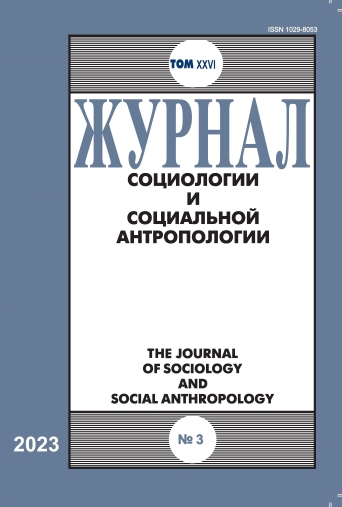V.R. Arsenyev’s Ethnosophical Utopia
Abstract
The aim of the article is to consider the social aspects of the ethnosophical teachings of the Africanist V.R. Arsenyev (1948–2010). It is noted that Arsenyev criticizes the modern technogenic civilization, the alternative to which he saw in the archaic. He saw the signs of degeneration of modern civilization of the Western type in the replacement of reality with the world of artificial nature, the priority of material values, the opposition of people to nature, the desire to subjugate nature, the transformation of the psyche of individuals, the destruction of personality or “paradigmatic ego-centrism”. Industrial civilization has developed an unsustainable model of management, which Arsenyev, in conjunction with other features, called the paradigm of alienation. All this indicates the exhaustion of the path of development represented by Western civilization. His field studies provided the scientist with sufficient material to study archaic societies and archaic consciousness. However, the archaic he wrote about does not mean a return to the earlier stages of social evolution. Archaic as a new stage of socio-historical life, according to Arsenyev, primarily manifests itself in a change in the worldview and value orientations of society, the expression of which is ethnosophy. In addition to its worldview role, ethnosophy has a methodological and epistemological function, since it is a synthetic discipline of a “transitional type” that is necessary for the transition to a new civilizational type, identified by Arsenyev with archaics. Civilization is a type of secondary societies, i.e. opposing nature, while archaic is a primary type of society incorporated into nature. Among the features of archaic worldview principles, which are reflected in social life, he attributed integrity, the unity of man and nature, society and the environment, sparing use of nature, etc. The conclusion is made that the weak definition of the social outlines of archaicism indicates the utopianism of the ethnosophic project itself.
References
Арсеньев В.Р. (1996) Альтернативы будущего. СПб.: б. и.
Арсеньев В.Р. (2011) Бамбара: культурная среда и овеществленный мир западно-суданского этноса в коллекциях МАЭ РАН. СПб.: МАЭ РАН.
Арсеньев В.Р. (2008) «Империи страха» и «империи выживания»: вызовы глобализма и постглобализационная перспектива. Общество. Среда. Развитие, 4: 145–156.
Арсеньев В.Р. (2006) Свод основных понятий этнософии. Манифестация. Учебно-теоретический журнал «Ленинградской школы африканистики». № 7а (Приложение). СПб.: Европейский дом.
Арсеньев В.Р. (2009) «Слон» как мир и мир как «Слон»: концептуальные и тривиальные стороны видения мира и движения в нем. Общество. Среда. Развитие, 1: 141–169.
Бочаров А.Б., Володин А.В. (2023) «Диалектика мифа» А.Ф. Лосева как теоретическая база в подходе к этнософии. Международный журнал исследований культуры, 1: 19–32. https://doi.org/10.52173/2079–1100_2023_1_19.
Браславский Р.Г., Козловский В.В. (2020) Цивилизационный анализ и модели истории в перспективе интеркультурного взаимодействия. Интеркультурная философия: полилог традиций. СПб.: Интерсоцис: 164–174.
Варапетян А.Э. (2017) Критические заметки П.Б. Струве о происхождении идеи «гниющего Запада». Философский полилог, 2: 136–142.
Волкова Е.А. (2022) Современная отечественная историография этнософии. Гуманитарный акцент, 3: 82–88.
Назарова О.А. (2021) О сущностном отличии «меж-» от «интер-»: от межкультурного к интеркультурному философскому полилогу в европейском культурном пространстве. Философский полилог, 2: 24–42. https://doi.org/10.31119/phlog.2021.2.141.
Спепанянц М.Т. (2020) Межкультурная философия как эпоха, схваченная в мысли. Философский полилог, 1: 11–25. https://doi.org/10.31119/phlog.2020.1.105.
Янутш О.А. (2022) Этнософия: 100 лет в поисках себя. Общество. Среда. Развитие, 4: 11–14.

